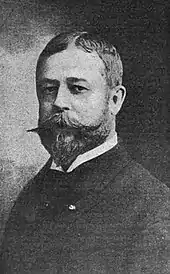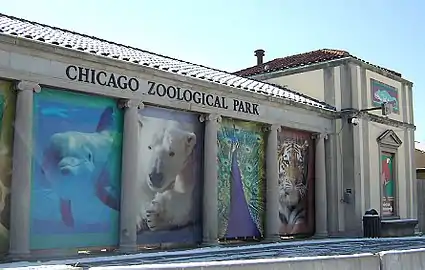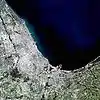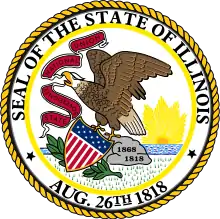Brookfield, Illinois
Brookfield (formerly Grossdale) is a village in Cook County, Illinois, United States, located 13 miles (21 km) west of downtown Chicago. Its population was 18,978 at the 2010 census.[3] The city is home to the Brookfield Zoo.
Brookfield, Illinois | |
|---|---|
Village | |
 Part of Brookfield and neighboring La Grange Park | |
 Location of Brookfield in Cook County, Illinois | |
.svg.png.webp) Location of Illinois in the United States | |
| Coordinates: 41°49′22″N 87°50′51″W | |
| Country | |
| State | Illinois |
| County | Cook |
| Township | Lyons, Proviso, Riverside |
| Incorporated | 1893 |
| Government | |
| • Type | Village-manager |
| • President | Kit P. Ketchmark |
| Area | |
| • Total | 3.07 sq mi (7.95 km2) |
| • Land | 3.06 sq mi (7.93 km2) |
| • Water | 0.01 sq mi (0.02 km2) 0.33% |
| Population (2010) | |
| • Total | 18,978 |
| • Estimate (2019)[2] | 18,310 |
| • Density | 5,975.85/sq mi (2,307.64/km2) |
| Down 0.56% from 2000 | |
| Standard of living (2007-11) | |
| • Per capita income | $31,651 |
| • Median home value | $263,600 |
| ZIP code(s) | 60513 |
| Area code(s) | 708 |
| Geocode | 17-08576 |
| FIPS code | 17-08576 |
| Website | www |
| Demographics (2010)[3] | |||
|---|---|---|---|
| White | Black | Asian | |
| 88.7% | 2.5% | 1.5% | |
| Islander | Native | Other | Hispanic (any race) |
| 0.03% | 0.2% | 7.1% | 16.2% |
Geography
Brookfield is located at 41°49′22″N 87°50′51″W (41.822681, -87.847532).[4]
According to the 2010 census, Brookfield has a total area of 3.067 square miles (7.94 km2), of which 3.06 square miles (7.93 km2) (or 99.77%) is land and 0.007 square miles (0.02 km2) (or 0.23%) is water.[5]
Most of Brookfield is flat land with various small hills and rises. Along Salt Creek is a steep ravine that is home to many oak savannas. These oak savannas are the primary ecosystem of Brookfield, and sprawl out from large, forested areas into small pockets in the village.
Demographics
| Historical population | |||
|---|---|---|---|
| Census | Pop. | %± | |
| 1900 | 1,111 | — | |
| 1910 | 2,186 | 96.8% | |
| 1920 | 3,589 | 64.2% | |
| 1930 | 10,035 | 179.6% | |
| 1940 | 10,817 | 7.8% | |
| 1950 | 15,472 | 43.0% | |
| 1960 | 20,429 | 32.0% | |
| 1970 | 20,284 | −0.7% | |
| 1980 | 19,395 | −4.4% | |
| 1990 | 18,876 | −2.7% | |
| 2000 | 19,085 | 1.1% | |
| 2010 | 18,978 | −0.6% | |
| 2019 (est.) | 18,310 | [2] | −3.5% |
| U.S. Decennial Census[6] | |||
As of the census[7] of 2000, there were 19,085 people, 7,536 households, and 5,034 families residing in the village. The population density was 6,252.4 people per square mile (2,416.0/km2). There were 7,753 housing units at an average density of 2,539.9 per square mile (981.5/km2). The racial makeup of the village was 93.53% White, 0.89% African American, 0.14% Native American, 1.24% Asian, 0.01% Pacific Islander, 2.88% from other races, and 1.31% from two or more races. Hispanic or Latino people of any race were 8.05% of the population.
The top five ancestries reported in Brookfield as of the 2000 census were German (23.2%), Irish (20.3%), Polish (18.0%), Italian (13.0%) and Czech (11.2%).[8]
There were 7,536 households, out of which 31.3% had children under the age of 18 living with them, 52.5% were married couples living together, 10.6% had a female householder with no husband present, and 33.2% were non-families. 27.8% of all households were made up of individuals, and 11.4% had someone living alone who was 65 years of age or older. The average household size was 2.50 and the average family size was 3.10.
In the village, the population was spread out, with 23.9% under the age of 18, 6.4% from 18 to 24, 32.3% from 25 to 44, 22.2% from 45 to 64, and 15.2% who were 65 years of age or older. The median age was 38 years. For every 100 females, there were 90.7 males. For every 100 females age 18 and over, there were 87.8 males.
The median income for a household in the village was $71,000, and the median income for a family was $64,075. Males had a median income of $45,293 versus $33,136 for females. The per capita income for the village was $24,307. About 2.3% of families and 4.3% of the population were below the poverty line, including 4.0% of those under age 18 and 6.4% of those age 65 or over.
Government
Nearly all of Brookfield is in Illinois' 3rd congressional district; the northernmost portion, a largely wooded area north of the zoo, is in the 4th district.
History
Before 1803, the area now called Brookfield was mostly covered by prairie grasses, forests, and farms. Large portions of the area were inhabited by the Native Americans who long ago developed agriculture and corn cultivation, built villages and burial mounds, invented the bow and arrow, and made beautiful pottery.

Settlement of the village dates to 1889 when Samuel Eberly Gross, a Chicago lawyer turned real estate investor, began selling building lots plotted from farms and woodlands he had acquired along both sides of the Chicago, Burlington & Quincy Railroad line, which provided passenger and freight service between Chicago and Aurora, Illinois. "Grossdale", as his development was originally called, offered suburban living at prices affordable to working-class families.
The first two buildings Gross erected were a train station south of the tracks at what is now Prairie Avenue, and a pavilion across the tracks. The original train station was moved across the tracks and a few hundred feet east in 1981, and is now the home of the village's historical society and museum, as well as listed on the National Register of Historic Places. The pavilion housed the first post office, general store, Gross' real estate office, meeting rooms, and eventually a dance hall. Gross offered free train outings from Chicago to Grossdale where the prospects were met at the station by a band and treated to a picnic lunch, with a sales pitch from Gross. In addition to parcels of land, he had a number of house designs to offer at "cheap" prices.
Gross later added the subdivisions of Hollywood (1893) and West Grossdale (1895), each with its own train station. Residents voted to incorporate as the village of Grossdale in 1893. The name was changed in 1905 after residents became displeased with Gross, whose personal life and fortune had floundered. A contest to choose a new name yielded "Brookfield" in respect for Salt Creek, which runs through the area. Gross also has a school named after him called S.E. Gross.
In 1920, the old Plank Toll Road, now called Ogden Avenue (US Hwy 34), was paved, providing easy automobile access to and from Chicago.
The Chicago Zoological Park, commonly called the Brookfield Zoo, opened in 1934. The zoo is located on land given to the Forest Preserve District by Edith Rockefeller McCormick in 1919.

Newspapers and publications
Throughout the 1930s, 1940s and 1950s, newspapers published in Brookfield included The Suburban Magnet and Brookfield Star. The largest and most successful newspaper printed in Brookfield was the Brookfield Enterprise. It was started in 1932 by Porter Reubendall, then owned and expanded in the 1950s by Elmer C. Johnson, and ceased publication in 1985.
Public education
Brookfield-LaGrange Elementary School District 95 is the primary elementary school district for Brookfield residents, and is made up of one elementary school (Brook-Park Elementary School[9]) and one junior high school (S.E. Gross Middle School[10]). Other Brookfield students may attend schools in Riverside School District 96, LaGrange Elementary School District 102, or Lyons School District 103. District 95 and 96 teens then attend Riverside Brookfield High School in District 208, while students from SD 102 and SD 103 (the southeast portion of Brookfield) attend Lyons Township High School, District 204, which has campuses in La Grange and Western Springs.
Transportation
Brookfield's connection to the Chicago, Burlington & Quincy lives on with Metra's BNSF Railway Line, which serves three stations in the Brookfield area: Congress Park, Brookfield, and Hollywood. Metra trains operate daily between Chicago and Aurora. Various Pace bus stops exist throughout the village, as well as common trolleys.
Attractions
- The Brookfield Zoo, managed by the Chicago Zoological Society, is open every day of the year.
- The Galloping Ghost Arcade is the largest video arcade in the United States with over 550 video and pinball games.
- North Kiwanis Park is a major area for many annual events such as German Fest, Fall Fest, Battle of the Bands, and the Brookfield Fourth of July Parade.
- The Brookfield oak savannas are the town's most natural and beautiful place, with many animal and plant species.
- The Grossdale Train Station now houses the Brookfield Historical Society. Built in the 1880s, it is the oldest structure in Brookfield, having existed since before the city was founded.
- Salt Creek flows through many suburbs and is a tributary to the Des Plaines River. The creek is wide and long, with gentle, murky water, good fishing, and vast amounts of wildlife.
- The Festival of Sausages, a celebration of German heritage, hosted every year by Brookfield resident, Chad Vandemark
- Jaycee Ehlert Park is the largest park in Brookfield. It was home to Brookfield's renowned carnival, "Brookfest", before it was cancelled in the mid-2000s due to various gang fights and firework malfunctions.
Notable people
- William L. Blaser, Illinois state representative and businessman[11]
- Milt Bocek, former outfielder of the Chicago White Sox
- Douglas Campbell, Green Party candidate from Michigan
- Michael Colgrass, Pulitzer Prize-winning composer
- Jim Holvay, guitarist/songwriter for the band The Mob, known for four hit songs written for The Buckinghams ("Kind of a Drag," "Hey Baby (They're Playing Our Song)," "Don't You Care," and "Susan")
- Tom Kondla, basketball player with the Minnesota Pipers and Houston Mavericks of the American Basketball Association
- Joy Layne, 1950s pop singer[12]
- George Marsh, Medal of Honor recipient during the American Civil War, born and enlisted in Brookfield[13]
- Lou Saban, football player and coach for several college and professional teams
- Allen C. Skorepa, lichenologist
- Katelyn E. Stowe Olympic 1 meter diver
References
- "2019 U.S. Gazetteer Files". United States Census Bureau. Retrieved July 14, 2020.
- "Population and Housing Unit Estimates". United States Census Bureau. May 24, 2020. Retrieved May 27, 2020.
- "Profile of General Population and Housing Characteristics: 2010 Demographic Profile Data (DP-1): Brookfield village, Illinois". U.S. Census Bureau, American Factfinder. Archived from the original on February 12, 2020. Retrieved February 19, 2013.
- "US Gazetteer files: 2010, 2000, and 1990". United States Census Bureau. 2011-02-12. Retrieved 2011-04-23.
- "G001 - Geographic Identifiers - 2010 Census Summary File 1". United States Census Bureau. Archived from the original on 2020-02-13. Retrieved 2015-08-02.
- "Census of Population and Housing". Census.gov. Retrieved June 4, 2015.
- "U.S. Census website". United States Census Bureau. Retrieved 2008-01-31.
- "Profile of General Demographic Characteristics, Brookfield, Illinois" (PDF). Archived from the original (PDF) on 2011-06-17. Retrieved 2007-04-08. (38.9 KiB). U.S. Census Bureau. Accessed 2007-04-07.
- "Home - Brook Park Elementary School". www.district95.org. Retrieved 2020-12-02.
- "Home - SE. Gross Middle School". www.district95.org. Retrieved 2020-12-02.
- 'Illinois Blue Book 1965-1966,' Biographical Sketcgh of William L. Blaser, pg. 198-199
- http://www.rblandmark.com/News/Articles/8-13-2013/Brookfield-pop-star's-career-a-secret-no-longer/
- "George Marsh". Archived from the original on June 9, 2014. Retrieved June 8, 2014.
External links
| Wikivoyage has a travel guide for Brookfield (Illinois). |
- Village of Brookfield official website
- Brookfield Public Library
- Brookfield Matters, community-contributed news

